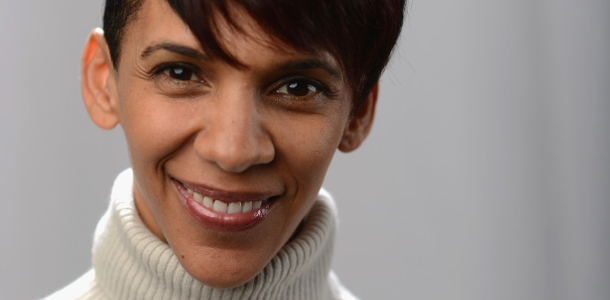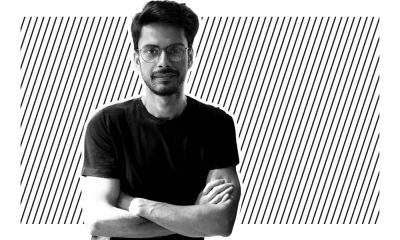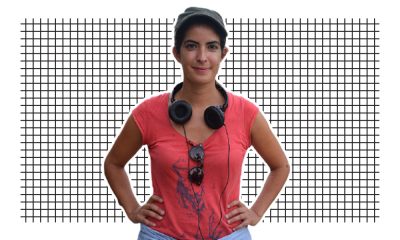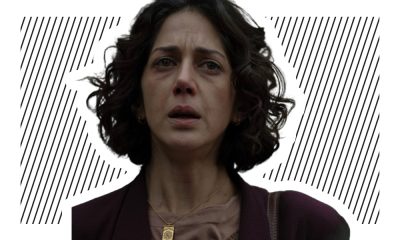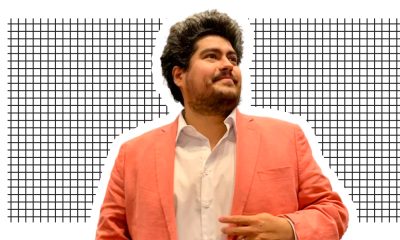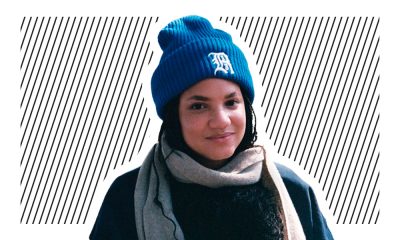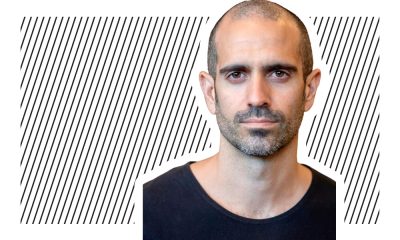Interviews
Interview: Marta Cunningham (Valentine Road)
Larry King, the 15 year-old boy who’s murder became the genesis for Marta Cunningham’s jaw-dropping, tear-jerking powerhouse investigative debut, Valentine Road, is memorialized through his loving illustration in the words of the many who loved him. With that in mind, the film stands firmly on the notion that neither murder nor the lengthy imprisonment of a 15 year old murderer is justifiable. Seeking the origins of hate that led Brandon McInerney to shoot his classmate before his fellow students, Cunningham stares sternly into the horrifying gaze of unabashed, home grown prejudice and let’s those willing to speak their mind in juxtaposition to the testimony of those still mourning Larry’s passing.
Cunningham has come from the opposite side of the lens, initially making her way in the film business as an actress and dancer. Now a mother of two, she is spending her time behind the camera, both directing and producing with her company Off the Wall Productions. King’s case is her first major venture into the feature length documentary form, but she’s navigated the waters with steely confidence. I sat down with the director, radiating a natural warmth and wanting to direct the interview as if it were her own, at the 2013 Hot Docs Film Festival. Her film premieres tonight, October 7th, on HBO at 9pm.
Jordan Smith: Saw it [Valentine Road] last night, I was mind-bogged and devastated.
Marta Cunningham: Yes, thank you.
Jordan Smith: I know you mentioned that you live within driving distance of where it actually took place, is that how you heard about the story – how did you get involved?
Cunningham: I actually read a little excerpt in the Southwestern Poverty Law Center magazine in my son’s library and was so shocked by the story in two ways – the story itself about Brandon and Larry, but also the fact that I hadn’t heard anything about it – was upsetting to me. That there was a school shooting even, that wasn’t really being publicly televised.
Jordan Smith: Especially since it is so close.
Cunningham: So close to Los Angeles – and just children. I mean you have two kids involved, one was looking at life and the other one was dead and just that amount of apathy that I think people had at that time about school shootings was also very sad to me and overwhelming.
Jordan Smith: For me the film was mostly about intolerance and this weird spread of different feelings about that, whether its the people that were being intolerant and they don’t even realize it and obviously the people who were effected by it, as you were piecing it together – how were you taking it as the filmmaker trying to piece it together?
Cunningham: I think from the very beginning, when I started realizing that this story needed to be about both of the boys, that we understood why it happened – the journey was to create a platform so people felt comfortable enough to express their true feelings about it. For me to be kind of a vehicle or to bear witness to their experience.
Jordan Smith: You did some acting right, before this film?
Cunningham: I did – I was an actor.
Jordan Smith: Was that your gateway into the film – did you have an interview experience? A lot of the interviews are very very raw and you obviously had to coax that out of some.
Cunningham: Actually, you know I think what they felt was my empathy for both of the boys – I don’t think acting was involved or having to be an actor, or knowing anything about acting. I think it was really on a human level because you are talking about people who are so broken by this incident – really permanently damaged in some ways. You know when you are speaking about a mother who has lost a son, or a mother who has a child in prison for the next twenty-one years, thats going to change you profoundly for the rest of your life. I am a mother, I think that also had something to do with it, so my level of empathy that I had for the people in this horrible incident – they felt that.
Jordan Smith: How was it trying to convince some of these people to be in it? I can only imagine the anguish some of them are feeling and to be willing to be on film – most people don’t even want to be on film for just an average day and you’re getting to their deepest darkest moments.
Cunningham: You know, I think a lot of it has to do with time – I was on this for a very long time and I was in that court room everyday of that trial, I was in the court room before the trial, for the pretrial, for the hearings. So they got to know me, they knew me as a person and so the trust was built over a period of time – I think that has a lot to do with it.
Jordan Smith: The film is really complex, structurally – you start with the actually crime and you thoroughly explain what happened and then you kind of move to all the different moving pieces – the characters and the themes and different sides of the story. How did you decide to put the pieces where they are? It all feels very fluid, but you are moving from piece to piece to piece within just a matter of moments.
Cunningham: Well that is when it is very important to hire incredible editors, that is when you realize as a director that you have to hire people who understand your vision and are really capable and passionate about creating that. My editors Tchavdar and Yana – we worked together for months and even before we really started cutting, we put together a really basic outline that we stayed pretty close to. The cards on the board, you know.
Jordan Smith: You obviously sat through the trial – how long was the shoot in comparison to the editing, because a lot times people don’t even find their film until they spend months editing.
Cunningham: Well we were on a Sundance deadline, so our editing was much shorter than our editors wanted – lets put it that way. For me too, fair enough, really we only had five and a half months to cut over 300 hours of footage. So I started shooting in 2008 and we stopped filming, gosh, I think our last shoot was maybe even while we were editing. Like the beginning of the film and the Valentine Road sign – I think was near the end. The finishing funds.
Jordan Smith: For me part of the emotion, without any soundtrack it still would have been blunt and emotional, but the soundtrack really makes it this layered experience. I really felt like all of the soundtrack choices were perfect and they are all kind of different. There are the mood pieces and then songs that generally don’t work in documentaries, these pop songs. You have pop songs but they have soul and really work for the scenes, how did you go about choosing these?
Cunningham: You are the first person that has every asked me about the music and I’m so glad that you have because I am a muso, I was a dancer professionally before I was anything else, so music is a part of my being and it was extremely important that we had choices and a music supervisor who was incredible. The composer Michael Orendy who has two groups and is an incredible musician himself – this was his first time scoring. So we really worked hand in hand – his sense of what I was trying to convey through music he got immediately and it was a fantastic experience.
Jordan Smith: I was trying to check out the credits and I was going from song to song as fast as I could but I wanted to see who the last song was, do you know off the top of your head?
Cunningham: You know who that is – its Macklemore and Ryan Lewis, it’s called “Same Love”. That was brought to me by my music supervisor Dave Stone. Luckily we had so much time together, Dave Stone and I, to really understand what film we were making and the music selection. He had so many amazing contacts because he works with Bunim-Murray productions. So he was like how about this, what about that and was constantly sending us music and when I heard “Same Love”, it was before Macklemore and Ryan Lewis blew up, I was like this is perfect, I watched their video and said – oh my god, we have to have this song. I always knew it was going to be my end song. So yeah I love music, I wanted to have the youth represented in this film and music is the best way to do that. I wanted young people to come see the film and support the film because its for them.
Jordan Smith: Do you feel like the film has been, or will be, a way to process this event for the people that went through it or do you think its going to be too hard for them? You said that a lot of people haven’t seen it yet and understandably because there are some difficult parts of the film.
Cunningham: There are certain people that I want to see it – when they’re ready, definitely I want to be there for them through that process, the young people especially.
Jordan Smith: It takes a really unbiased approach, as much as you can to an event like this. To me, its shocking some of the stuff you have onscreen, what they said – without you coaxing it, it just came out of them and its shocking. As I said, it is unbiased, but do you think if they watched what they have said in the movie, or saw the movie as a whole that they’d still feel the same.
Cunningham: I don’t know, I don’t know how they are going to feel – I really don’t.
Jordan Smith: When I was watching it, I was like – I cannot believe these people are saying this.
Cunningham: That is their truth, that’s how they felt you know and I think that – I don’t know, I mean I honestly have no idea what their reaction is going to be. But I do know that – that’s how they felt and when they talked to me thats what they said, so we’ll see.
Jordan Smith: HBO is involved?
Cunningham: Yes.
Jordan Smith: I am curious how HBO got involved, was it at an early stage – if so how did it happen? They are obviously a big supporter of documentaries – good documentaries.
Cunningham: Yeah, really good docs. We are very very excited that we are going to be on HBO and that we have been working we HBO. I can’t think of a better place for it, really. The care and nurturing that Sheila Nevins and Lisa Heller have given to our team has been extraordinary. The team over at HBO, they are true lovers of film and true supporters of Larry and Brandon’s story being told.
Jordan Smith: Did you pitch it to them or did they come to you?
Cunningham: What ended up happening was – they knew of the story and they knew that we were working on the film and my producer had met with them early on and they were interested in seeing the final product. When they did – they bought it.
Jordan Smith: Congrats on that.
Cunningham: Thank you so much.



